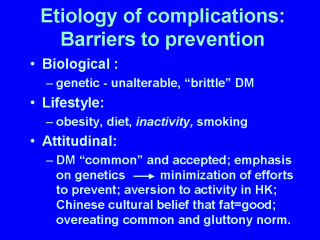| front |1 |2 |3 |4 |5 |6 |7 |8 |9 |10 |11 |12 |13 |14 |15 |16 |17 |18 |review |
 |
So, given that
around 1 in 10 HK adults have DM, and that around 1 in 7 have impaired glucose tolerance,
and by current figures, 22% will develop complications, then around 140,000 people in HK
are currently at-risk of DM complications, and up to 1 million are potentially at-risk
(based on a population of 7 million). As the population ages, this figure will increase. Thus, the importance of prevention is obvious. So, what are the barriers to preventing complications? There is nothing that can currently be done to alter genotype in adults, and this is not likely to be feasible in the foreseeable future. However, the complacent attitude brought about by "genome-hype" that all diseases will be cured by taking a pill gives most people no incentive to alter their behaviours. Immediate gratification almost always wins out over longer term self-restraint. So this attitude does make matters worse. For the next ten years at least, lifestyle factors will remain the main point for intervention. That means increasing activity and decreasing over-nutrition. |
| front |1 |2 |3 |4 |5 |6 |7 |8 |9 |10 |11 |12 |13 |14 |15 |16 |17 |18 |review |